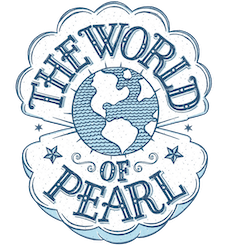If you have ever heard my talks on pearls you understand that a grain of sand can never form a pearl. But, with all the reading I have been doing on natural pearl formation and the 2000 year old pearl, I have read some great information further proving why a grain of sand can never form a pearl. The following info is part of the wonderful research by Prof. Dr. H.A. Hänni, Retired director of SSEF Swiss Gemmological Institute.

The first reason why sand can never form a pearl is because it truthfully just isn’t invasive enough. If you can imagine, these mollusks are filter feeders, constantly sucking in water and expelling it out. They encounter a lot of sand and it never spurs the creation of a natural pearl.
But here is a little more in-depth info for you…

Pearls are formed by mantle tissue, the same tissue that lines the interior of a shell and secretes CaCO3 to actively form the mollusk’s shell. According to Prof. Hänni, “natural pearl formation excludes the wide spread sand-grain theory mainly because sand grains are inactive and never actively intrude into the outer mantle tissue.” (Hänni, 2002).

To start the pearl making process in a natural pearl, there must be an injury to the mantle tissue. Such an injury will displace mantle cells causing them to relocate to another area within the soft conjunctive tissue the mollusk. Again, we HAVE to have these cells to start forming a pearl because these are the cells that excrete the CaCO3 (calcium carbonate). Pearls are comprised of the same CaCO3. These tissues form a pearl sac and coat the intrusion with calcium carbonate to form the pearl.
What might damage the mantle tissue? We now know a grain of sand just isn’t intrusive enough to damage the mantle tissue. We will have to look at something a little more violent like an animal attack.
In conclusion, Hänni explains, “All natural pearls are mantle-grown, as the mantle is the only organ that is able to secrete CaCO3 and thus form pearls without human intervention.”
There you have it! Just because you have a grain of sand does not mean you will have a natural pearl!
India
I am a modern day treasure hunter who travels the world for gorgeous pearls and amazing adventures. I own a pearl jewelry and jewelry repair business, ThePearlGirls.com, with a cute retail store in Athens, GA. I also have a Pearl Travel business and travel blog at TheWorldofPearl.com.


